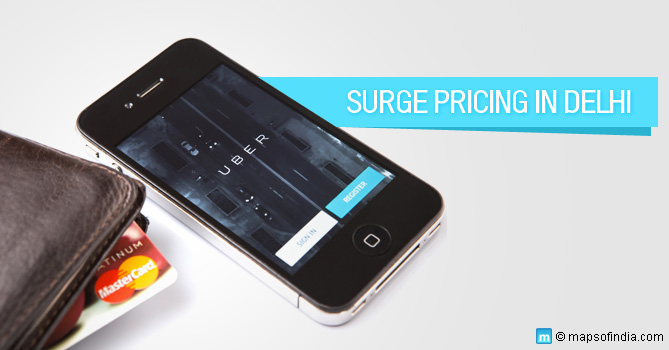Those who find black and yellow taxis in Delhi and elsewhere in the country unreliable in terms of availability and services, have started to find app-driven Uber and Ola taxis to be the answer to their prayers. Uber, in particular, has been rapidly expanding services in various Indian cities and now serves about 30 metros and smaller towns in the country.
Once you download the Uber app on your smartphone (Android phone or iPhone), it points to your location and as you ask for a cab, the exact location of the cab that has accepted your ride is visible along with the time required for it to report (usually a few minutes). Key in your payment instructions (card or mobile wallet) or choose cash payment and you’re on your way. What is better is that Uber or Ola cabs are available round the clock. What can dampen the growth path of these companies, right? Looks like their Surge Pricing policy could.
What is Surge Pricing?
At times when the demand for cabs is high, such as during rush hours, Uber (and Ola) prices automatically rise. Such an increase is notified to the person requesting for a cab through the app. If the user agrees to pay the increased fare, a cab is booked and the final bill reflects the “surge price”. From the user’s point of view, it may seem that the surge pricing policy is an exploitation of the high demand and need of various users. Uber, however, has a different viewpoint. Uber does not own the cabs that ply in its name. It is a technology-based company that has managed to form a network of drivers with cars willing to join their system. Thus, Uber merely connects the driver with the end user.
According to Uber, Surge Pricing is a technique to ensure reliability of services in lean phases. It encourages more drivers to get on the road at times when demand is higher. When more drivers get on the road due to the ability to earn more, supply increases and the Surge itself doesn’t last for more than a few minutes. Surge pricing has often been known to go up by even 2.5 times the price of a regular ride during rush hours. In cities such as Kolkata, Uber has charged surge prices as high as four times the regular fare during natural calamities such as floods.
Karnataka Bans Surge Pricing
On 6 April, the Karnataka government introduced a ban on surge prices for Uber, Ola, and similar companies. According to the government the fares (per kilometres) are set by the companies according to the government policies for radio cabs and Uber, Ola etc. shall not be permitted to introduce a markup over these set fares. Soon after this announcement, the Maharashtra state administration also announced that similar fare slabs and guidelines would be finalised for cab aggregators in the state. This means that soon, the app-based cab services such as Uber shall also be prevented from imposing Surge in the state.
Delhi Government’s Take on Surge
On 15 April 2016, the Arvind Kejriwal-led AAP government of Delhi embarked on its second phase of the odd-even formula that allows only odd-numbered private cars to ply on certain days and even numbered on others. As a consequence of this restriction, the demand for taxis soared in the national capital and so did Surge. Delhi CM Arvind Kejriwal initially took to social media warning cab aggregators against “overpricing”.
Within a couple of days, on 18 April, he tweeted, “Strict action, incl permit cancellation n impounding vehicle, to be taken against taxis which charge rates more than govt prescribed rates”. Reacting to the temporary ban on surge for the duration of the second phase of odd-even implementation, Uber and Ola withdrew Surge till 30 April. The same day, the government agencies impounded over 50 cabs for violating the ban.
On 20 April, Kejriwal once again reacted to the issue of taxi aggregators and surge pricing. He tweeted –
“Surge pricing is daylight robbery. No responsible govt can allow that(1/2)”
“Some taxis saying they will not provide cab if they are not allowed to loot. This is open blackmailing n govt will not let that happen(2/2)”
The Ban Will Be Permanent
If the Delhi government’s decision to ban surge pricing temporarily attracted flak, the state was not quite ready for the reaction when he agreed to make the ban a permanent one. Reacting on Twitter to a suggestion that the ban on surge should continue even after the odd-even phase has ended, the Delhi CM said, “Yes. We will do it”.
As anticipated, Uber criticised the decision strongly, and said that without the incentive that surge offered, there would be very few cabs available when necessary.
In its statement, Uber told its customers “Not surging is saying we should be just like a taxi and be unreliable when people need us most. These are outcomes that take choices away from the consumer and make it harder to get around cities – these are outcomes that we put a lot of hard work in to avoid so that at least you have the choice if you want one.”
Meanwhile, Delhi Transport Minister, Gopal Rai, said that the state government would soon be introducing a pricing policy for app-based taxi companies similar to the one in practice for radio cabs.




